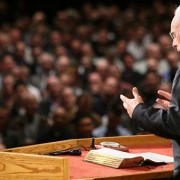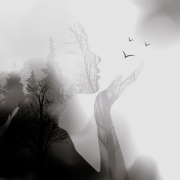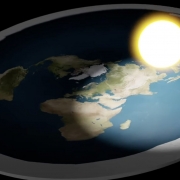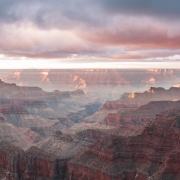What if Thanksgiving were a time to celebrate the natural creation?
This article originally appeared on November 23, 2021 at Baptist News Global.
Christian churches in the United States often take advantage of national holidays to communicate particular theological points. For example, Memorial Day and Veterans Day provide opportunities to celebrate the idea of Jesus sacrificing his life on the Cross for spiritual freedom. Independence Day triggers celebrations of freedom from the tyranny of sin. And Thanksgiving Day prompts gratefulness for all God has done for us and in us.
Gratitude during Thanksgiving worship gatherings tends to focus on themes of spiritual creation, of new birth, of being a “new creation.” But what if we considered gratitude in terms of what God has done for and in us through the physical creation?
Ever since the church realized that the entire universe does not center on the earth, Christianity has had a troubled relationship with science. Some Christians have gone so far as to say that this world is not our home, that we’re “just passing through.” As scientists began to realize the undeniable case for evolution, deep time and quantum physics, evangelicalism in the United States became even more disconnected from reality and “other-worldly” in its focus.

Rick Pidcock
After young earth creationists sowed decades of doubt in evangelical churches about scientific consensus and conspiracies about the agenda of the scientific community, it was only a matter of time before a pandemic would come along that would reveal how out of touch with scientific reality the church had become.
For more than a century, evolution primarily has been approached with fear. Evangelicals are afraid of what evolution might mean for their theology of Adam, and by extension their theology of Jesus. Even Christians who accept evolution often feel quietly bothered by how different the story of evolution is from what they read in Genesis.
But if evolution is how God created everything we see today, then evolution is what God has done for us and in us. And thus, to deny evolution is to be ungrateful for what God has done.
What, then, if we began listening to scientists with postures of gratitude for what God has done rather than with fear over what that might mean?
The wonder of discovery
In an interview with BioLogos, biologist Lynette Strickland told how her natural curiosity led her to study the evolution of beetles. Describing the tortoise beetle, she said: “They incorporate so many different forms of coloration, namely structural coloration. So they have a lot of gold and silver, metallic and iridescence. And they also have these so the edge of their body is enlarged and flattened. And anytime they get sort of scared or anxious, they’ll pull everything underneath and flatten themselves to the leaf.”
For Strickland, “studying variation is one of the most satisfying things. And especially in beetles who are arguably the most diverse and species-rich group of organisms on the planet. And so much of their success has been attributed to this variation to their diversity.” She explains that beetles have diversified so much in their evolutionary story that humans have discovered more than 350,000 species.
The wound of disappointment
For Christians who deny evolution, however beautiful some part of creation may seem, wonder can only dissolve into disappointment.










Trackbacks & Pingbacks
[…] What if Thanksgiving were a time to celebrate the natural creation? […]
Leave a Reply
Want to join the discussion?Feel free to contribute!